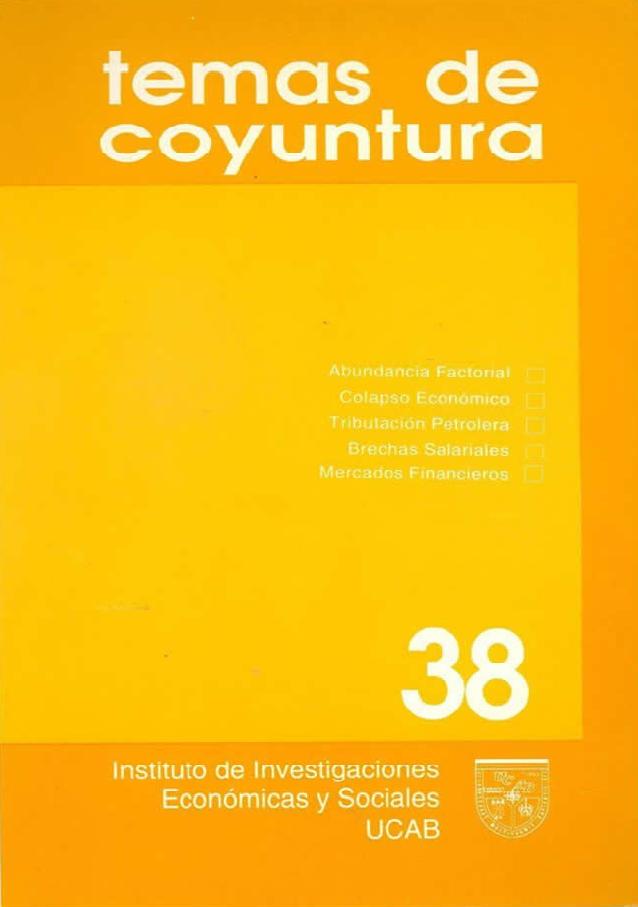NOTAS SOBRE LA ABUNDANCIA FACTORIAL EN VENEZUELA
Resumen
Utilizando técnicas de contenido factorial, este ensayo presenta estimaciones sobre la intensidad factorial del comercio internacional venezolano. Se incluye un set detallado de factores productivos en cada categoría de recursos naturales, capital físico y mano de obra. Los recursos naturales y el capital físico se mostraron, en términos agregados, como los factores más abundantes y más escasos del país, respectivamente. Dentro del grupo laboral, las ocupaciones asociadas con servicios profesionales, servicios administrativos y servicios de secretaría se mostraron entre los factores más abundantes, mientras que las ocupaciones relacionadas con los servicios manuales y no manuales técnicos especializados se mostraron entre las más escasas. Los resultados sugieren que la escasez de habilidades laborales asociadas con la producción de bienes transables limitan el crecimiento del sector externo no petrolero.
Descargas
Citas
BALDWIN, Robert E., “Determinants of the Commodity Structure of U.S. Trade”,
American Economic Review, Vol. 61 (1971): 126-146.
BHAGWATI, J., “Immiserizing Growth; A Geometrical Note”, Review of Economic
Studies, Vol. 25 (1958): 201-205.
BOWEN, H. P., Learner, E. and Sveìkauskas, L., “Multicountry, Multifactor Tests of the Factor Abundance Theory”,Arnerican Economic Review, Vol. 77 (1987): 791-809.
BRECHER, Richard A. and Ehsan U. Choudhri, “The Factor Content of International Trade Without Factor Price Equalization”, Journal of International Economics, Vol.12 (1982): 277-283.
CARDOSO, Eliana and Ann Helwege. Lalín America ’s Economy. Diversity, Trends,
and Conflicts, Cambridge: MIT Press, 1992.
CLIFTON, Donald S. and MARXSEN, William . “An Empirical Investigation of the Heckscher-Ohlin Theorem”, Canadian Journal of Economics, Vol. 17 (1984): 32-38.
DEARDORFF, A. V., “Testing Trade Theories and Predicting Trade Flows”, in Jones,
R. W. and Kenen, P. B.(eds.), Handbook oflntemational Economics, NonhHolland, Amsterdam, 1984.
GIFT, Richard and MARXSEN, William . “Aggregation and the Factoral Content of Trade”, Journal of Political Economy, Vol. 92 (1984): 979-984.
HELPMAN, Elhanan, “The Factor Content of Foreign Trade”, Economic Journal, Vol.
(1984): 84-94.
KRUEGER, Anne O., “Trade Policies in Developing Countries”, in Jones, R. W, and Kenen, P.B. (eds.), Handbook of International Economics, North-Holland, Amsterdam, 1984.
LEAMER, Edward E., “The Leontief Paradox, Reconsìdered”, Journal of Political
Economy, Vol.88 (1980): 495-503.
: Sources of International Comparative Advantages.' Theory and Evidence, Cambridge: MIT Press, 1984.
MASKUS, Keith E., “A Test of the Heckscher-Ohlin-Vanek Theorem: The Leontief
Commonplace”, Journal of International Economics, Vol. 19 (1985): 201212.
MASKUS, Keith E., SVEIKAUSKAS, Catherine D. and WEBSTER, Allan. “The Composition of the Human Capital Stock and its Relation to International Trade: Evidence from the U.S. and Britain”, Weltwirschaftliches Archiv, Band 130 (1994): 50-76.
MASKUS, Keith E.; BLYDE, Juan and STONE, Jill Van. “The Contribution of Detailed Labor Skills to U.S. Trade with Canada and Mexico”, The North American Journal of Economics and F inanceL Vol. 5 (1994): ISS-200.
STERN, Robert M. and MASKUS, Keith E. “Determinants of the Structure of U.S. Foreign Trade, 1958-76” Journal of Intematìonal EconomicsL Vol. 11 (1981): 207-224.
TREFLER, Daniel, “International Factor Price Differences: Leontief Was Right!”,
Journal of Political Economy, V01.101 (1993): 961-987.





.png)



